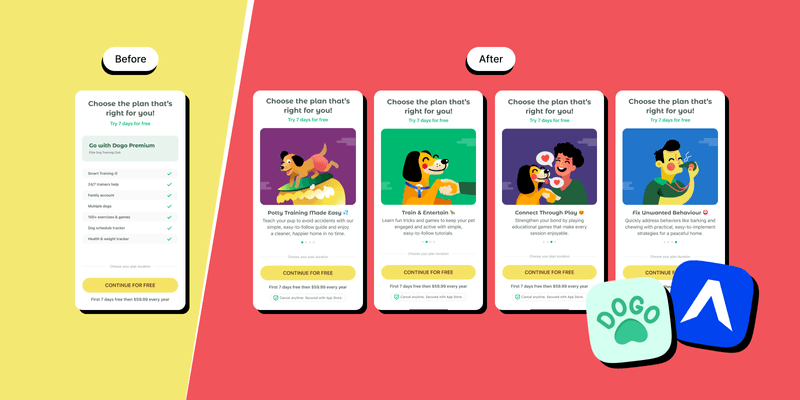The MaxDiff method: A smarter way to test paywall value propositions
At Applica, we’ve run countless paywall experiments, and this method consistently helps us understand what matters most to users.

In partnership with Dogo, a leading dog training app, we utilized this powerful user research technique to uncover which features users value most. This allowed us to refine Dogo’s value proposition and optimize their paywall for better results. Here’s a step-by-step look at our process and how you can apply it to improve your app.
Identifying the challenge
Dogo already had a well-optimized app, so achieving incremental improvements required a more granular approach. Their existing two-tier paywall highlighted features like smart training plans, family accounts, and exercises and games.
However, it wasn’t clear which benefits resonated most with users. Our goal was two-fold:
- Identify the most valued features across key user segments.
- Rebuild the paywall to prioritize these insights, ensuring relevance and clarity for each audience.
Why MaxDiff?
MaxDiff analysis (short for “maximum difference”) forces users to make trade-offs between options, helping to eliminate the “everything’s important” bias often seen in traditional surveys. Users rank what they value most and least, allowing us to determine the relative importance of each feature with confidence.
In Dogo’s case, the insights from MaxDiff informed two critical areas:
- Packaging strategy: Aligning what users value most with free and premium offerings. If distinct segments showed differing preferences, this could also pave the way for segment-based pricing tiers.
- Optimization strategy: Prioritizing the benefits that matter most on the paywall, tailored to specific user segments for maximum relevance.
Running the MaxDiff study
To ensure actionable results, we focused on five key steps:
- Define the target audience: We included both potential and existing users to gain diverse insights.
- Segment users effectively: We identified four meaningful user groups:
- Non-dog parents
- Puppy parents
- Adolescent dog parents
- Adult dog parents
- Ensure a reliable sample size: To reach statistical significance, we aimed for 150 responses per segment – a total of 600 responses for four segments.
- Adjust for response rates: Knowing participation rates can range from 10% to 70%, we scaled the total audience size accordingly.
- Incentivize participation: We offered extended free trials to potential users and subscription discounts or renewals to existing users to encourage responses.
Pro Tip: Using platforms like SurveyKing makes creating and distributing MaxDiff surveys seamless. Design your survey to be user-friendly, covering enough value propositions to gather reliable insights.
This is an example of what ours looked like:

Applying the results
From our MaxDiff study, we uncovered a clear hierarchy of user preferences across segments. For instance:
- Puppy parents valued potty training features and smart training plans.
- Adolescent and adult dog parents prioritized new techniques and tricks and enhanced bonding.
We applied these insights directly to Dogo’s paywall strategy:
Segmented paywall designs:
- For puppy parents, we highlighted potty training and included all four benefit screens.
- For adolescents and adults, we removed the potty training screen and focused on the other key benefits
Puppy parents variant

Adolescents and adults’ variant

Results:
- Puppy segment: 19% uplift in ARPU
- Adolescent segment: 17% uplift in ARPU
By aligning the paywall messaging with user priorities, we delivered clear, compelling value propositions that resonated with each audience segment.
Key takeaways for your app
- Start with the data: Use MaxDiff analysis to identify which benefits matter most to your users.
- Focus your messaging: Highlight the most impactful features on your paywall to maximize conversions.
- Tailor by segment: If user preferences vary significantly, consider designing segment-specific paywalls.
- Test and iterate: Run A/B tests to refine paywall designs, messaging, and layout for continuous improvement.
- Show the impact: Use clear visuals and concise copy to effectively communicate your app’s value.
Final thoughts
Paywall optimization isn’t just about beautiful design; it’s about communicating value in a way that resonates with your audience. By leveraging MaxDiff analysis, we helped Dogo not only convert more users but also foster long-term retention.
About Dogo
Dogo is a comprehensive dog training app designed to make training fun, effective, and accessible for dog owners and their furry friends. With a wide range of interactive features, Dogo provides step-by-step guided lessons, personalized training plans, and daily challenges to support dogs of all ages and breeds. Developed in collaboration with professional trainers and veterinarians, the app caters to diverse behavioural goals, from basic commands to addressing problem behaviours.
With a mission to strengthen the bond between pets and their owners, Dogo empowers dog lovers to nurture well-behaved and happy companions right from the comfort of home.
About Applica
Applica is a growth partner for mobile and web apps, focused on delivering results through experimentation, organic growth, and paid promotion. Our clients value our behavioural-driven approach, fast-paced optimizations, and deep expertise. See the Dogo UX design case study on Behance.
You might also like
- Blog post
Modeling attribution on iOS: what works, what doesn’t, and how to choose
How to navigate the messy world of SKAN, AEM, and probabilistic attribution — plus two practical frameworks to get a clearer picture of campaign performance.
- Blog post
Your sprints must pay for themselves: Dan Layfield’s product advice
What’s worth building? Dan Layfield shares a 3-bucket framework to help app teams prioritize features, fix churn, and ship faster.
- Blog post
Is monetization hurting your app’s user experience?
Don’t trade short-term revenue for long-term trust. How ethical UX can still drive effective monetization.

